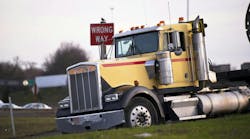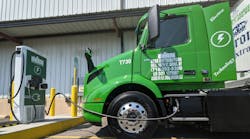It's time for some straight talk about raising truck weights. We need a rational discussion about the benefits and drawbacks of allowing trucks to carry more cargo, and it starts with dropping euphemisms like sustainability and productivity, and challenging opponents to do the same.
First we need to recognize that much of the public opposition to increasing truck weights is emotional. Any motorist who's sentient feels some intimidation when sharing the road at speed and close quarters with a vehicle so much larger and so much heavier than even the most gargantuan SUV. White knuckles on the steering wheel trump vague promises of “improved supply chain efficiencies” every time.
The current push from trucking advocates is centered on raising gross maximum weights for tractor-trailers from 80,000 lbs. to 97,000 lbs. Proponents point out that this would not create “larger” trucks, only heavier ones. But let's be honest, for most of the general public a heavier truck translates into a bigger truck. And physics is on their side since more weight means more momentum at speed that has to be dealt with when stopping or maneuvering, and more destruction in the event of a collision.
And then there are the arguments that follow to justify that visceral rejection of raising truck weight limits. The most common is bigger trucks pose an increased safety risk to the public, followed by claims that heavier trucks will destroy our roads and increase congestion with ponderous acceleration and low top speeds.
Trying to hide behind soft terms like productivity or culturally positive ones like sustainability won't cut it. In fact, it may actually be counterproductive, sounding like the salesman with something to hide. I say face the issue head on, address the critics directly, and build credibility for what is in the final tabulation a plus for everyone.
Let's start by being honest about the elephant in the room. People's safety concerns about heavier trucks may be based on an emotional response to bigger trucks, but they're not unreasonable. Trucking should be out front in acknowledging that another 17,000 lbs. at 55 mph represents a significant amount of force, and higher gross weights potentially increase the damage that could be caused in an accident.
The response to this argument needs to be education. Few in the general public know just how far truck technology has come in the past decade. Most don't know about common things like full ABS on tractors and trailers, and new braking distance requirements, not to mention the industry's rapid progress on active safety systems like stability control, vehicle detection, active braking, and other advanced electronic systems that even 10 years ago seemed like pipe dreams.
Everyone in the trucking industry is well aware of changes in driver training and requirements, but I doubt it's common knowledge that today's truck driver faces rigorous licensing barriers, ongoing drug and alcohol testing, and constant performance monitoring by both employers and regulators. And think what you may about the inconveniences of CSA, but the fact that there's a system in place to rapidly identify bad performers — be they drivers or the fleets they work for — should be reassuring to a dubious public if only they knew about it.
And the capper, of course, is trucking's excellent and constantly improving safety record. After that, the other arguments about lower congestion and emissions from fewer trucks, as well as a more efficient and cheaper distribution system, should begin to make real sense, the kind that's impossible to ignore.


